- Home
- Dusty Richards
The Abilene Trail Page 9
The Abilene Trail Read online
Page 9
Chapter 10
Dawn came like the soft glove of a woman sweeping the coating of dust off a deeply polished walnut gun stock. The sunshine’s first light made the distant cottonwoods blurry in the glare. A cold wind out of the distant panhandle swept them. The fishy smell of the Rio Grande filled Ben’s nostrils, and the bawling of cattle on the move in the distance made him feel better despite the fire holes he had for eyes that he tried to take all this in with.
Hap was busy feeding the boys. Digger and Billy Jim had all their day’s horses on hand. It was time to herd cattle. Everyone had a case of the yawns, and Chip slapped his own face twice. “So I’m sure that I’m really here.”
Martinez drove out in a one-horse buggy before the cattle ever came into sight. He reined up his mare and smiled as though nothing had ever happened.
“Good morning, Señor Ben.”
“Morning, Martinez. All we’ve got is coffee.”
“Oh, I’ve had mine. A drink, señor?” he asked, holding up some whiskey that looked golden in the direct sunbeams striking the bottle.
“No, Martinez, I have to be able to count, so you don’t cheat me.”
“Cheat you, señor? Why would I want to cheat you?”
“Last fall, you said, ‘I will have eight hundred big steers on the border before Christmas.’ Well, Christmas is only ten days away.”
“I will find the others, but big steers—”
“How many you sending over?” Ben asked.
“Four hundred twenty—thirty.”
“All big ones—three and four years old?”
“Most of them.”
“You know how far it is to Abilene?”
“Where is this?” Martinez blinked his eyes.
“Kansas,” Ben said, putting a boot on the buggy’s iron step.
“No, I never been there.”
“It’s three months—four months up that way.” He flung his arm northward.
“Long ways.” Martinez squirmed in the seat.
“Long ways. They won’t buy junk in Kansas. They won’t pay for little Mexican calves.”
Martinez set down the bottle and held up his hands. “In three weeks I will have the rest.”
“Make it four weeks,” Ben said.
“Why?”
“It will be full moonlight then and your bandit friends won’t be able to sneak up on us.”
“I have no bandit friends, mi amigo.”
Ben shook his head. “That Salano is a big one.”
“Oh, no, señor, he is my banker. No bandito—businessman.”
“Miguel!”
The youth rode over.
“Take off your sombrero and show him what Salano’s men did to you.”
“Oh, I am so sorry. Must have been a big mistake.”
“Boys, form a line on both sides. Billy Jim, you count them, Chip, you and Mark watch for limpers. Digger, you rope the ones they point out and drag them out.”
Ben started to get in the saddle. He turned back. “You tell Salano I’ll tack his hide to my outhouse next time he tries something on me.”
“But . . . but—”
“I’ll settle with you when we get the cattle counted and the culls cut out.” Ben checked his horse. “How many more good ones have you got down there?” He gave a head toss toward Mexico.
“None, señor.”
“Better send your man back for the rest of the big ones. I seen lots of little steers in them coming out of the river.”
An angry mask swept Martinez’s face, and he drove his buggy to the river. Ben couldn’t hear the trader’s conversation with his segundo, but soon five of his men rode south in a hard gallop.
Ben surveyed the operation and his hands at work. Small steers were being shunted off to the side. Some were roped and dragged; others were cut out. Billy Jim stood in the stirrups as serious-looking as Ben had ever seen him, counting the passing cattle.
When the last of the dripping-wet cattle came up from the river and went past him, Billy Jim shouted, “Four hundred thirty.”
“Good,” Ben said, and rode over for a conference with Chip, Mark, and Digger, who sat their hard-breathing horses.
“How many small ones got by you two?”
“Not over a dozen head. Some slipped in and out and we had no time,” Chip said, shaking his head.
“We cut back most of the limpers,” Mark said.
“We got all we could, Mr. Ben,” Digger said, wiping the sweat from his face on his sleeve.
Ben shook his head and held up his hand to dismiss their concern. “I’ll pay him for a dozen small steers. How many did you boys cut?”
“I can count them,” Mark said, and hurried off to make a survey.
The bunch of small and crippled steers, obviously hungry, were grazing hard, and Mark rode through them, making his census. He came back in a long trot.
“I counted twenty-seven head.”
“Good, they’re bringing some more; Billy Jim, count them,” he warned his man at the approach of more steers across the river.
“They look okay?” Ben asked.
“They’re walking all right,” Billy Jim shouted. “Forty-two more.”
Ben rode over to where Martinez sat in his buggy. He dismounted heavily, adjusted the holster, and dug out the sack of gold coins from his saddlebags.
Martinez climbed out of his rig and straightened his flat-brimmed black hat. “I’m sorry about the inconvenience, señor.”
“I need four hundred more big steers.” Ben met the man’s gaze with a hard stare. “When are you delivering them?”
“Ah señor—”
“Don’t ‘ah’ me. I want the rest of your promise.”
“In four weeks?”
“My boys counted twelve head of small steers in there that got by. I’m only paying a dollar a head for them. That means three hundred and ninety three in the first bunch, forty-two in the second one. That means I owe you ten thousand and ninety-seven dollars and change,” Ben said, finished with his pencil calculations in his small logbook.
“That is all you counted?”
“There’s twenty-seven culls over there.”
“Twenty-seven!” Martinez slapped his forehead. “What would you give me for them?”
“Ten bucks.”
“Ten dollars! Oh, Mother of God, how will I feed my little ones?”
“I ain’t paying a dime more for that junk.”
Martinez made a “give-me” sign with his fingers. Ben counted out eleven stacks of one hundred dollar bills. When he finished, Martinez swept them off the buggy seat where Ben had set them up in stacks, and gave Ben the difference owed.
“Four weeks, and they better be good steers.”
“You don’t understand, señor. There are no big steers left in the brush.”
“Look harder,” Ben said, and stepped into the saddle. He reined the roan around. “Tell that bandit Salano, next time we meet he better be packing a gun, too.
“Chip, you take the right lead, Mark the left. Miguel, you’re on Chip’s side. Toledo, you’re on Mark’s side. Digger, today you’ve got drag. Billy Jim, you help Hap get going and look after the horses. Later we’ll swap positions.
“Let’s head for home, boys.”
“Yeah,” came the roar, and they rode out to take their places.
Ben watched Martinez in his buggy head back for the river. Doing business with a liar was not his cup of tea—would the man have the rest of his cattle in four weeks? No way to know. He still had time before he started north. Blair told him uniform sets of large steers sold the best. But his plans depended on having at least an eight-hundred-head drive to top the market with. No knowing and damn sure no telling what they’d try next time, either.
He touched his spur to the roan. He needed to find a campground and a place to graze them later that day. Close to nine already he decided, checking the sun. The steers acted hungry to him—must not have been much graze over in Mexico where they held them.
/>
“Get those culls. I bought them too,” he shouted to Digger.
“We gets ’em, Mr. Ben.” And Digger waved him on.
Chapter 11
By scouting ahead, Ben found a small creek to water the cattle. There was lots of dry grass and even some sprouting green through the bunches from the last rain. Should be lots of wild oats sprouting from the past rains, too, Ben decided. It would sure fatten his steers; they appeared to be pretty hollow, but most desert cattle out of Mexico looked that way. Mature steers on good forage fattened at an astounding rate. Small ones usually grew some more, but didn’t fatten, which was his reason for buying the older ones. He wanted to walk them slowly to Abilene, have them slick as moles, and top that market. It wasn’t a senseless drive he planned for them, so that when he arrived there they’d be fleshy. That would take longer, but in the end make him the most money. Heading those steers north in a trot would get them there in less than two months—but those lean greyhounds he arrived with wouldn’t bring anything.
Satisfied with the creek campsite, he tied a red rag on a mesquite top about head high to mark it and headed back to tell Hap. What came next? The weeklong drive home. He wiped the grit out of the corners of his mouth with his thumb and thought about Jenny. Be a new way of life for him, to have a wife. He looked forward to it.
He short-loped the roan through the dead brush country. The black brush and tree skeletons cast a grim look to the rolling country. It would be good to get back to the live oaks and running water of home.
He rested the roan and waited for the approaching wagon. Billy Jim was bringing the horse herd after him. He hoped the boys were doing as well with the steers. The steers had been bunched for a while, and he could hope that they weren’t too wild, but anything could happen to that many spooky cattle.
“Got camp picked. You and Billy Jim get the water you’ll need before the cattle muddy it up. I hung a red flag in the brush for you as a marker.”
“Good enough. We’ll find it. You reckon them birds will try us again?” Hap asked.
“I won’t bet against it,” Ben said.
Hap stood in the wagon looking back for signs of the herd on their back trail. Ben thought he could see a trace of dust on the horizon.
“I’ll check on them. You and Billy get camp set up. They’ll be hungry as bears by the time they get here in midafternoon.”
“You know it ain’t far back to Mexico from here,” Hap said.
Ben nodded that he heard him. Maybe eight or nine miles from the river was all they’d make that day. They still would be a tempting target for Salano and any other rustlers. In fact, Ben felt certain that until they were halfway home, nothing but a bullet in their head or heart would stop the bandits from trying to take the herd.
In early afternoon from a rise he surveyed the cattle coming in a long, serpentine train. He could see his men in place, stretched out for over a half mile, save poor Digger riding drag, and he was somewhere back in the dust that over sixteen hundred hooves churned up. They’d all get a chance at the job. Then if one of them was hurt, sick, or gone, someone else would know how to handle that job.
Ben rode in and joined Mark. “What do you think of longhorns now?”
“They want to go too fast at times, but Chip and I’ve backed off and they seem to slow some. I think they’re hungry. We can fill them, they’ll be easier to slow down. They’re going too fast, aren’t they?”
“Yeah, I’d like them to be more leisurely. They’re damn near in a trot.”
“I figured that,” Mark said over the clatter of horns, hooves, and bawling cattle.
“Don’t worry; we’ll be in camp in an hour and they can eat all they want there.”
“What about the water?”
“Near level-bank creek; they shouldn’t pile in on each other.”
“See you,” Mark said, and Ben drifted back to find Toledo swinging a rope with a leather popper on the end.
“Going okay?”
“Ah, sí, Señor Ben, gracias for taking me along.”
“You’re welcome, though you may cuss me before Kansas for asking you on.”
Toledo, his coffee-brown face floured with dust, laughed. “I am a vaquero, and we like to work.”
“Good,” Ben said, and dropped back, pulling up his kerchief to filter some of the dust. Out of nowhere, Digger burst in on his ring-eyed horse, both coated in the pale soil of south Texas.
“Boss man, you scared me. I thought you were a rustler.”
“Sorry. How is the job going?”
“Besides the dust, it’s not bad.”
“Wind’s coming up, and that should help,” Ben offered.
“Hope it comes soon. I better go check—I got some really poky ones.”
“Be in camp in an hour,” Ben promised and waved good-bye. He let the herd go on and the dust around him settle on the land. Sitting on a high point, he surveyed the country to the south. No sign of any dust from riders on the horizon—but he wouldn’t sleep easy until they were back home at his ranch. In four weeks they’d come back and get the rest—he hoped.
After watching for any sign of pursuit for over twenty minutes, he fell in and rode north after the herd, satisfied. They’d be to camp by the time he got to the head of the line.
The hungry steers took quick drinks; then, bawling, they crossed the nearly dry creek and began harvesting bunches of grass on the next flat. Ben watched them, pleased for the most part. They didn’t act too volatile. Mature steers were the worst. Most had been in the thorny thickets and not been touched since castration and branding as yearlings or even calves. The rest of their lives they’d successfully avoided humans.
Rainbow cattle, black, black-brown, red, and speckled, they came in all colors, he decided. A four- to-six-foot span of horns on each head. Pushed close together on the move, the whack of horns sure made lots of noise, and in a thunderstorm green lightning danced across their heads. Ben hoped he never saw that happen again, but knew it was more than likely going north so early. They’d be there in time to dance with a tornado or two up on the plains.
“See anything out of place?” Hap asked when he rode into camp.
He gave his man a shake of the head and dropped out of the saddle. “No sign.”
“Don’t mean they ain’t coming.”
“Sure doesn’t.” Ben bent over, used the handkerchief from his pocket for a pot holder, and poured coffee in his tin cup. “For now we can rest.”
“Got the boys coming in for coffee and fried pies in shifts,” Hap said.
“You and Billy make them?”
“Naw, Bill did most of the work. I was laying out supper while he did that.”
“Where’s he at?”
“Out relieving cowboys—he missed getting in on the action today.”
Ben nodded that he heard him. Billy Jim didn’t want to be only the horse wrangler. The strong coffee revived Ben. Then he went to water his pony and turn him out for the night. It would be a half hour before sundown, but already the cattle were beginning to act full and drop down to chew their cuds. That should settle them in for the night.
They didn’t need any wild stampede or rustlers spooking them. But it well could happen. Be home in a week, Jenny. Love to see your face, not some dust-coated puncher’s mug. They’d be a long week getting there.
He closed his eyelids tight, wishing the tears he was forcing out would drive the gritty sand out from behind them. The tough work had begun.
After supper, Ben put Toledo and Chip on night herding for the first three hours. He had Billy Jim bring two horses he felt would be the easiest for them to use. Some horses never made night-herding animals. The good ones could slip around the herd with the cowboy on board talking or singing, never spooking or waking up animals in their circuit around the perimeter. They could see in the darkest night or the rainiest one, never stepped in a prairie dog hole nor lost their footing in a dead run to force the herd to circle back in a stampede. While none of h
is ponies had ever been on any drives except roundups, Ben had to think hard about the best to choose.
“Boys, sleep with your pistols. We’re keeping horses saddled and on the picket line in case the banditos didn’t get enough last night.”
Everyone nodded, some went to bed, and the two night riders took off for the herd with Ben’s instructions to sing or talk so that they didn’t spook the bedded-down cattle.
He promised to wake up the next shift, Mark and Digger. Then he sat back and savored Hap’s coffee. The Spencer close by, he listened to an owl hoot off in the growing darkness. He sure hoped those rustlers had enough from the night before, but one could never tell. After his coffee, he told Hap good-night and set out on his horse to see about things.
He stopped on a rise and turned his ear to the night wind for any sounds, but heard nothing save some insects and distant coyote yaps. Nothing—then an owl hooted and he saw the bird of prey riding the slight up drafts. His belly looked snow-white against the sky. Then he dove from the sky and a rabbit screamed in pain. The owl was fetching his supper. Ben booted his pony on westward, intending to make a wide circle, looking for any sign of trouble or a threat.
Nothing. He checked by the boys on guard and they’d not heard or seen anything out of the ordinary. He went back to camp.
“All’s well out there?” Hap asked in a sleepy voice.
“Not a thing.”
“Good.” The cook turned over, pulled the cover atop his head, and soon was lightly snoring.
Ben changed the guard. Mark and Digger rode out. That left Billy Jim and Miguel for the last one. Ben dozed a short while, then woke and walked out his stiffness in the cool air. He checked the Big Dipper. It would be another hour before the shifts changed.
His eyes felt like hot sand holes. The coffee left on the fire was too thick to stir and too bitter to drink. Two sips was too much, and he tossed it aside. He almost wished the bandits would come on so they could get it over with. Damn.
Two more sleepless nights and Ben felt they were over fifty miles from the border. The boys were settling into a routine and reading the Big Dipper for the time themselves. He threw his bedroll down before sunset that evening, crawled into it, and died.

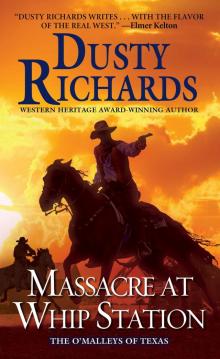 Massacre at Whip Station
Massacre at Whip Station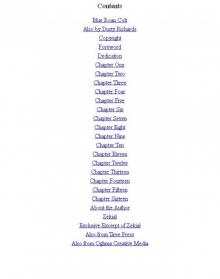 Blue Roan Colt
Blue Roan Colt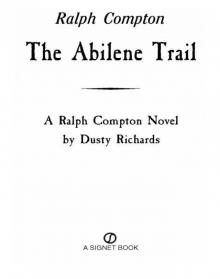 The Abilene Trail
The Abilene Trail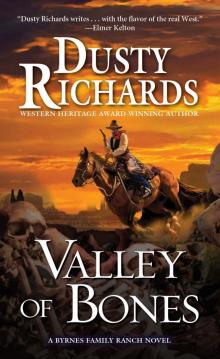 Valley of Bones
Valley of Bones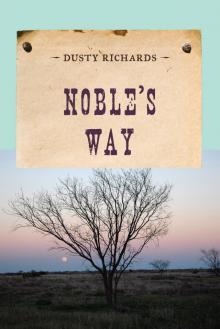 Noble's Way
Noble's Way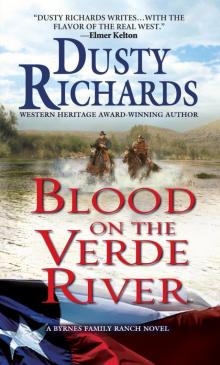 Blood on the Verde River
Blood on the Verde River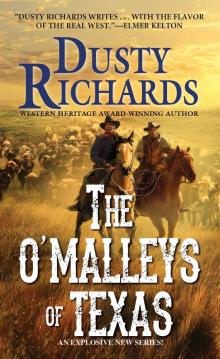 The O'Malleys of Texas
The O'Malleys of Texas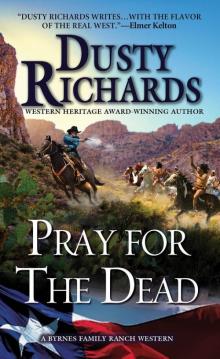 Pray for the Dead
Pray for the Dead Arizona Territory
Arizona Territory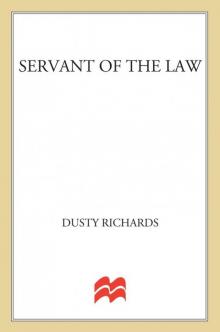 Servant of the Law
Servant of the Law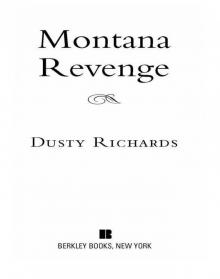 Montana Revenge
Montana Revenge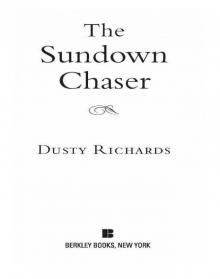 The Sundown Chaser
The Sundown Chaser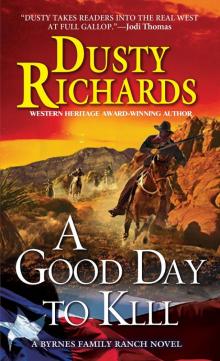 A Good Day To Kill
A Good Day To Kill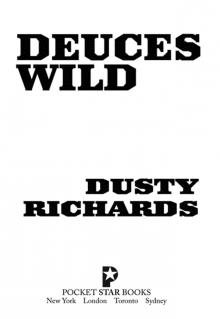 Deuces Wild
Deuces Wild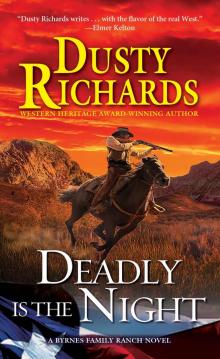 Deadly Is the Night
Deadly Is the Night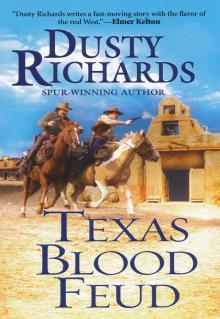 Texas Blood Feud
Texas Blood Feud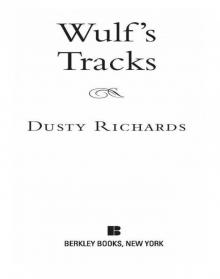 Wulf's Tracks
Wulf's Tracks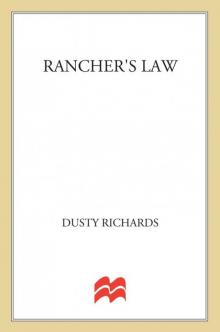 Rancher's Law
Rancher's Law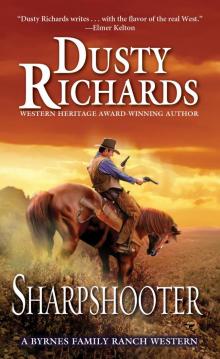 Sharpshooter
Sharpshooter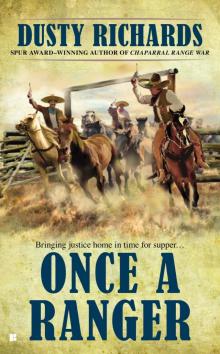 Once a Ranger
Once a Ranger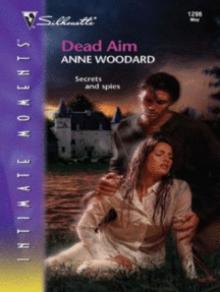 Dead Aim
Dead Aim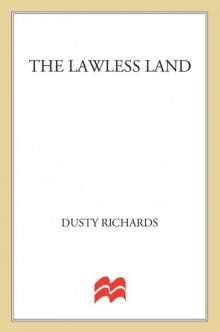 Lawless Land
Lawless Land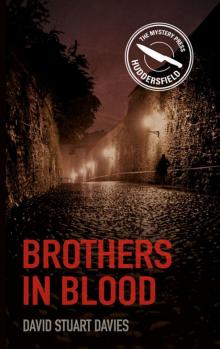 Brothers in Blood
Brothers in Blood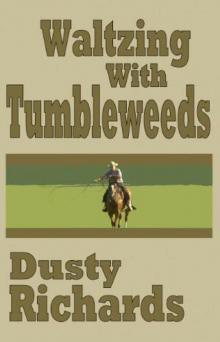 Waltzing With Tumbleweeds
Waltzing With Tumbleweeds